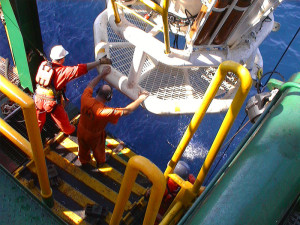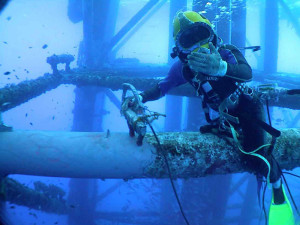Click here to download a PDF version of this Code of Practice
Overview
This Code of Practice is designed to provide information to current or prospective students. This document applies to all training and assessment services supplied by ADAS. As a Registered Training Organisation (RTO), ADAS has an obligation to operate within the Principles and Standards of the Australian Skills Quality Authority (ASQA) and the Australian Qualifications Framework (AQF).
Please note that, with some limited exceptions when courses are delivered directly by ADAS personnel, ADAS training and assessment courses are delivered through Accredited Training Establishments (ATEs). ADAS places responsibility on these ATEs and their training staff for providing students with relevant and appropriate information on course administration and training information in these instances.
The Organisation
ADAS (the Australian Diver Accreditation Scheme) is the Australian national occupational diver training and certification scheme. It was developed by the Commonwealth Government in 1988 to promote safe occupational diving operations through accredited training and assessment and diver certification. It is administered by the ADAS Board of Directors through a Memorandum of Understanding with the Department of Industry, Innovation and Science and operates on a cost recovery (not‑for‑profit) basis.
ADAS provides occupational diver training and assessment through Accredited Training Establishments (ATEs), both commercial and non-commercial (Defence Force, Universities etc). Since its inception, ADAS has expanded to include training and assessment for numerous hyperbaric industry occupations including, but not limited to: diving, diving supervision; diver medical technician; chamber operations, remotely operated vehicles, and hyperbaric tunnelling.
ADAS provides training and assessment services within its scope of registration as an RTO which may be viewed on the Training.gov.au website.
Training Programs and Standards
Based on Standards AS/NZS 2299.1 & .2 and AS 2815 (Parts 1-6)
Each ADAS diver and diving supervisor training and assessment course is based on the requirements of the relevant components of the Australian and New Zealand Standards 2299.1 Occupational Diving Operations, 2299.2 Occupational Diving Operations (Scientific Diving), and the Australian Standard 2815 series.
Diver and diving supervisor training and assessment available through ADAS includes:
- Aquarium diving
- Aquaculture diving
- SCUBA diving to 30m
- SSBA diving to 30m
- SSBA diving to 50m
- Bell diving
- Onshore supervision
- Offshore supervision
AS2815 Standards
AS 2815 Standards were developed by the SF/17 Diving Committee of Standards Australia in conjunction with Australian and international diver training authorities. They define the minimum acceptable competency standards for the various levels of occupational divers and diving supervisors.
AS 2815 training and certification of occupational divers, is published in six parts:
- Part 1: Occupational SCUBA diver (AS 2815.1)
- Part 2: Surface supplied diver to 30m (AS 2815.2)
- Part 3: Surface supplied diving to 50m (AS 2815.3)
- Part 4: Closed bell diving (AS 2815.4)
- Part 5: Dive supervisor (AS/NZS 2815.5)
- Part 6: Restricted occupational SCUBA diver (AS/NZS 2815.6)
Non-Diving Standards
Non-diving related ADAS courses, such as Hyperbaric Tunnel Worker or Chamber Operator, have also been developed in accordance with relevant Standards.
ADAS Certification
ADAS provides a licence to those who have been assessed by an Accredited Training Establishment (ATE) as successfully meeting the competency requirements of the relevant Australian/New Zealand Standards.
An ADAS licence is only valid while certificate holders undertake their work in accordance with appropriate legislation and operational standards.
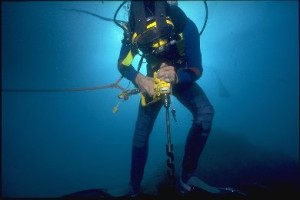
Recruitment
All applicants for ADAS training must comply with the general prerequisites listed below and any course-specific prerequisites before starting training.
Diving Candidates
Occupational diving is a high-risk occupation that requires candidates and certified divers to be exposed to the hazards of hyperbaric and aquatic environments.
It can involve strenuous activity in and under the water, and the performance of tasks that require the candidate to have reasonable degrees of mobility, agility, dexterity and strength. Candidates will be required to enter and exit the water from boats, piers and jetties and to assist team-mates to do so. They will need to don and doff heavy items such as weight belts and scuba tanks, to load and unload equipment from vehicles and to rescue and recover their teammates from the water in emergencies.
Candidates must be able to communicate clearly and accurately with teammates and supervisors; to relay instructions to and from divers underwater; to write accurate, clear, concise and legible reports on inspections and underwater work; and to carry out reasonably complex mathematical calculations involving pressure, time, depth, changes in buoyancy, decompression etc.
In the interests of personal and team safety, no allowances can be made for any disability which affects the ability to operate as a fully functioning dive team member.
Prerequisites for ADAS Training
Medical Fitness of Candidates
Divers, and anyone who is subjected to substantial changes in pressure as they descend, ascend, and operate at depth, are exposed to a range of physical, physiological, and medical effects that can increase the level of risk. These effects are well known and understood, and modern diving medical and fitness standards, and diving practices and procedures are designed to control those risks within acceptable limits.
The existence of certain physical, physiological and medical conditions are also recognised to substantially increase risk factors.
The Australian and New Zealand Standard AS/NZS 2299.1 Occupational Diving Operations requires occupational divers/hyperbaric workers to be certified as medically fit to undertake occupational diving. The Standard also prescribes medical fitness levels for occupational divers and hyperbaric workers, and details the medical examination and tests to be carried out by a medical doctor, specially trained in underwater medicine.
All ADAS trainees undergoing initial training must, before commencing practical diving, be in possession of a valid medical certificate showing them as being fit to dive.
Entry level courses such as Aquarium, Aquaculture, Restricted SCUBA, and SCUBA require the dive medical to be issued within 90 days of the start of the course. If for any reason the medical certificate is older than 90 days, the medical history of the candidate during the intervening period must be checked to identify if there were any obvious occurrences that would require the candidate to be re-assessed by a doctor.
> Also see Medical Fitness
Age of Candidates
The Australian and New Zealand Standard AS/NZS 2299.1 Occupational Diving Operations requires that candidates for all ADAS training be a minimum of 18 years of age.
> Also see Age Requirements
Fitness Levels and Water Skills of Candidates
Diver candidates are required to undertake reasonably arduous underwater activities involving manual handling, lifting and carrying, and extended times in and underwater. Candidates need to be reasonably fit and to have good swimming skills. They must be able to competently swim a minimum of 200 metres in good form without stopping.
The diver courses do not include basic SCUBA diving training and all candidates must hold a recognised certificate of recreational diving competence (e.g., a sports diver qualification from a recognised SCUBA training organisation, or a certificate as a military diver).
> Also see Medical Fitness
Language, Literacy and Numeracy Requirements (LLN)
Most training Standards have clear minimum requirements in regard to language, literacy and numeracy as explained below.
ADAS courses are designed to take account of this and all ADAS trainers and assessors provide:
- Materials, resources and assessment tasks which require students to have language, literacy and numeracy skills appropriate to levels used in the workplace;
- Clear models of the language/literacy/numeracy task;
- Opportunities for repeated and supported practice; and
- Opportunities for independent practice.
All students have the option to be assessed to ascertain if their literacy and numeracy skills are sufficient to successfully undertake the training program. This is usually via the ADAS LLN online test, by face-to-face interview/s with ADAS trainers, or by completion of exercises contained in the training program/s.
Language
Effective communication is a fundamental aspect of safety in occupational hyperbaric industries. Instructions and changes in situations and conditions must be able to be communicated clearly, concisely and accurately between supervisors, attendants and divers/hyperbaric workers. This is especially important under conditions of increased stress as may be experienced in an emergency and/or when communication is inhibited by adverse environmental conditions and/or substandard radio or telephone equipment. All team members must be able to communicate effectively in a common language. Additionally, occupational divers are often required to report on specific aspects of seabed, equipment or work site conditions with other divers or client representatives on the surface.
Candidates must be able to understand written and verbal communication in English and be able to communicate accurately in English with other people (this is of particular importance where trainees or instructors are of differing nationalities). The exceptions to this requirement are ADAS courses specifically conducted in a foreign language.
Literacy
Occupational divers, as part of their job, are often required to undertake underwater surveys and inspections and must be able to write accurate, clear, concise and legible reports on inspections and underwater work. They must display acceptable standards of spelling, grammar and syntax.
Numeracy
Occupational divers/hyperbaric workers are often required to carry out mathematical calculations involving pressure, time, depth, changes in buoyancy, decompression etc. Some of these are fundamental to effective dive planning and diver safety and others are required to fulfil the requirements of the job.
All ADAS candidates must be able to add, subtract, multiply and divide whole numbers, decimals and fractions; calculate percentages (non-programmable calculators may be used); and transpose and solve simple formulae to demonstrate understanding of, for example, the gas laws.
These mathematical requirements will be revised during ADAS courses, but candidates must commence the course with reasonable standards of numeracy in order to be able to cope with these demands.
LLN Test
ADAS has developed an online LLN test which is available to all potential students. This test is designed to assess the literacy and numeracy skills of applicants and provides ATEs with an indication of mathematical ability, language comprehension, composition, and grammar.
The LLN test is an ideal way for ATEs to evaluate the capabilities of student before they begin the training course and will provide guidance for the possible support required for each student.
While the test is not mandatory, it is highly recommended to all students as a way to pinpoint any areas of support that are needed, for both the student and the trainers.
Students completing a non-English language ADAS course are also encouraged to undertake the LLN test as it will indicate numeracy ability to students and trainers. There is a translate option available on the test to assist students who do not speak English.
You can find the ADAS LLN test on the ADAS Online Learning site.
Unique Student Identifier (USI)
All students planning to complete an ADAS course with an Australian based ATE are required to gain a Unique Student Identifier (USI) before they begin training. The USI system is regulated by the Australian Skills Quality Authority (ASQA) and allows students to access a complete record of their past Vocational Education and Training (VET) training outcomes.
Students enrolling in a training course must create a USI by completing an online application form via the USI website. Once the USI has been created, that unique code will be affiliated to that individual for the remainder of their training career and can be used for any future non-ADAS training.
Every Australian based Registered Training Organisation (RTO) is required to verify the authenticity of each applicant’s USI before any VET related testamurs can be issued to that person.
NOTE: If a student who is studying in Australia does not hold a USI the ARE NOT eligible to receive a VET qualification or testamur.
International Students and/or Training
Students who intend to train in Australia but reside out of Australia are also required to gain a USI. In these cases, students can use their Australian Visa in the place of a driver’s licence or passport in order to verify their identity.
Students who intend to train outside of Australia are not required to obtain a USI. This also means that transcripts will not be available for those students in the future.
More information about the USI system can be found on the USI website or by contacting ADAS or an ADAS ATE.
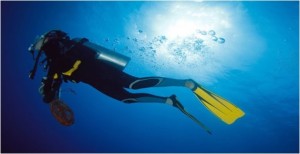
Participant Information, Enrolment and Orientation
ADAS and its ATEs will provide accurate, relevant and up-to-date information to participants prior to enrolment regarding their training and assessment program and options. This includes, as a minimum:
- Course outcomes and pathways
- Prerequisites
- Training and assessment arrangements, including Recognition of Prior Learning
- Fees and charges, including refunds
- Selection and enrolment of learners
- Support for students
- Complaints and appeals procedures
- Qualifications to be issued on completion or part completion of courses
- Competencies to be achieved during training
Information on individual Units of Competency from Training Package qualifications can be accessed via the Training.gov.au website. ADAS accredited course competencies are available from ADAS on request.
Student Induction
All students will undertake an induction process at the start of the training program. This induction will cover ADAS’ policies and procedures and provide details of the ATE’s own policies and procedures.
Students will be briefed on all relevant training and assessment issues including, but not limited to:
- Course program
- Timetable and assessment details
- Occupational Health and Safety standards
- Student behaviour and discipline
- Performance expectations.
Training Material
During the student induction process, the ATE will provide students with relevant training material. This material includes, but is not limited to:
- Course program
- Course texts and workbooks
- Student package
- Training Record Book
- Access to online learning material
Training Record Books (TRBs)
ADAS Training Record Books (TRBs) act as a central depository for all training related documentation such as diver medicals, First Aid certifications, and assessment tools. They also provide a summary of the required units of competency relevant to each course.
Both the student and the training manager are to sign declarations within the TRBs confirming the authenticity of the material contained within the book.
Student Package
ADAS Student Packages include all the information that students need about a particular programme, such as a list of the units of competency awarded upon completion of the course, and a copy of all the assessment tools completed during the course. Students are encouraged to familiarise themselves with this document early in the training program.
Student Privacy
ADAS is committed to supporting the National Privacy Principles which set clear standards for the collection, access, storage and use of personal information which ADAS obtains as part of its business operations.
Respect for ADAS customers’ right to privacy of their personal information is paramount. Policies and procedures are in place to ensure that all personal information, no matter how or where it is obtained, is handled sensitively, securely, and in accordance with the National Privacy Principles.
Use of Personal Details
Data, such as personal details, held by ADAS will be used for three primary purposes:
- Statistics:
- Personal information, in de-identified form, will be collated and used to produce statistics that may be supplied to the ADAS Board or other parties as required;
- They will also be used by ADAS administration for purposes of researching, developing and managing new and existing programs; for strategic and other planning; and for promoting the activities of ADAS
- Administration:
- Personal information will be used for the purpose of communicating with clients about their training, certification and/or their involvement in other ADAS activities;
- If a third party (e.g.: a contractor) is requesting information about an ADAS certification holder, ADAS will provide the third party with information about the level of certification, endorsements, expiry of certification, and location of training only if at least two (2) of the following can be answered by the person requesting this information:
-
- ADAS number
- Full name of ADAS certificate holder
- Date of birth of ADAS certificate holder
- Address of ADAS certificate holder
-
- Personal details on the database (date of birth, addresses, phone numbers, email address) are private and, under no circumstance, will this information be provided to a third party.
- Information:
- Personal details will be used for the purpose of providing information to participants about matters pertaining to ADAS activities or their individual certification status (e.g.: the ADAS newsletter);
- Any client may request not to receive communications that do not directly relate to their involvement in ADAS activities.
Training Records
Trainee records and personal information are always kept secure and confidential. This material is available on request by the candidate by giving written notice to the ATE or ADAS. All training and assessment material will be held on file by the training establishment for a minimum of seven (7) years.
Student Support
Each ADAS ATE is required to have systems in place to offer support to students if required. Support can be in the form of academic or personal support, with the type and level of support being assessed on a case-by-case basis by ATE staff.
Examples of support available can include: additional tutoring; provision of additional time to undertake practical assessments if a student was unfit to dive during the course; or language support. Please note that student support provided may incur a cost in addition to the training fees.
Mentoring Program
ADAS acknowledges that minority groups can benefit from additional support and guidance both during training and the first stages of their careers in the hyperbaric industry. In 2021, the ADAS Board elected to initiate a mentoring program to support new ADAS divers from minority groups. The first stage of the mentoring program is focused on women divers. New divers can access support from mentors with established careers in the hyperbaric industry who have experienced similar obstacles or difficulties.
Students wishing to utilise the mentoring programme are encouraged to contact the ADAS Executive Director by email or phone.
Resilience Awareness Training
Occupational diving students are required to undertake strenuous underwater activities that increase the level of physical and physiological stress, these stressors can potentially affect mental health. It is recommended that students maintain good mental health hygiene and consider completing the IMCA modules on Resilience Awareness, available free of charge at www.imca-int.com/certification/resilience/
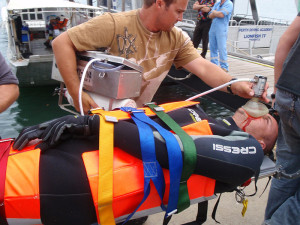
Training Delivery
ADAS ensures that training resources meet the requirements of the relevant training package(s) and/or accredited course(s), for the delivery, assessment, and issuance of qualifications.
ADAS affirms that it has in place, and applies, the following resources:
- Trainers and ADAS Training and Assessment Managers (ATAMs) with appropriate training qualifications and experience, and industry experience that is current and relevant to the course or modules they are assessing.
- Training delivery material and assessment tools and methods appropriate to the course or modules being conducted.
- Relevant Training Package and/or accredited course documents and support materials.
Delivery strategies utilised by ADAS are selected to best achieve the required outcomes from the elements of competence while giving full consideration to the learning style of the participant. Delivery modes may include, but are not limited to:
- Demonstrations
- Group participation
- Individual projects
- Learning support works
- Audio/visual presentations
- Site visits
- Online learning
ADAS theory training is normally conducted indoors using a variety of training aids and methods. Skills-based training is delivered in controlled, realistic environments using equipment and procedures similar to those used in the workplace.
All relevant training materials are provided by the ATEs.
Accredited Training Establishment (ATE) Compliance
ADAS is committed to maintaining high standards of diver training and assessment. Accordingly, ADAS actively monitors Accredited Training Establishment (ATE) compliance with Standards and ADAS requirements. This takes many forms including:
- Annual audits of all ATEs;
- Random audits of individual diver trainee records;
- Investigating any and all ATE trainee diver incidents and complaints.
Student Surveys
Once the training program is completed, students will be contacted by phone or email to undertake a post-course survey. This survey will provide ADAS valuable feedback in relation to course delivery, assessment procedures, training facilities, and course instructors. Responses are also valuable to assist ADAS in reviewing existing programs, and in developing future training and assessment activities.
Requirements for DMT Onsite
A current Diver Medical Technician (DMT) qualification must be held by at least one of the diving staff at the dive site. When a decompression chamber is associated with the dive, a DMT qualification is to be held by a member of the staff other than the diving supervisor, as the DMT may be required to enter the chamber with the patient.
Requirement for ATE to Provide a Qualified Stand-by Diver
ATEs are responsible for selecting suitable stand‑by divers and ensuring they are competent to act in that role. Since trainees are potentially more vulnerable than fully qualified divers, the stand‑by diver must be sufficiently experienced to cope with the full range of situations that may arise.
Student Stand-by Divers
ATEs must ensure that stand‑by diver training is conducted for students in appropriate conditions and at appropriate stages of the course.
Since student stand‑by divers need to be exercised during the training, the program should be arranged so that this occurs in situations where the depth, visibility and other conditions ensure that the risk imposed by the dive are acceptable for the level of training and experience of the trainee divers.
Assessment
All ADAS competency assessments are undertaken by qualified assessors who are skilled in the competencies they assess. Evidence of competence is collected using a variety of assessment tools.
To accommodate the needs of individuals, ADAS offers various assessment methods including skills recognition, simulations, and written and verbal assessments. All assessments are conducted using an open, supportive process, which ensures participants are aware of the precise requirements of their assessment.
All practical assessments are undertaken in a controlled environment providing realistic scenarios for participants to demonstrate their skills. Participants are deemed ‘competent’ when they can consistently demonstrate their skills and knowledge against all performance criteria to the standards required in the workplace.
All assessment outcomes are recorded in ADAS Training Record Books. All training and assessment records are held in the strictest confidence ensuring confidentiality and privacy of individuals. ATEs provide feedback to applicants about the outcomes of assessments and guidance on future options.
If students wish to appeal an assessment outcome, they can do so by following the ADAS Complaints and Appeals process (below), or the ATEs own processes.
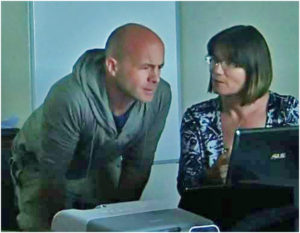
Assessment Principles
ADAS ensures that all assessment conducted within the organisation is valid, reliable, fair and flexible.
- Valid – Assessment activities will always meet the requirements as specified in the Unit of Competency or module. Sufficient evidence will always be collected and will be relevant to the standard/module being assessed.
- Reliable – All assessment methods and procedures will ensure that competency standards/modules are applied consistently and that there is always consistency in the interpretation of evidence.
- Fair – Assessment methods and procedures will not, under any circumstance, disadvantage any client.
- Flexible – Assessment will be offered in the workplace (on-the-job) (excluding practical diver assessments which are only carried out in a controlled training environment), in the training environment (off-the-job), in a combination of both, or via Recognition of Prior Learning/Recognition of Formal Training. ADAS will ensure that all assessment methods and practices allow for diversity with regard to how, where and when competence has been/will be demonstrated.
Practical Competency Assessment
Diving related assessments are planned to work up from shallow to deep dives. Situations that are likely to provoke apprehension and anxiety are introduced in a structured manner. The sequence is planned to assess the simple aspects before moving on to more complex and demanding assessments.
Trainees to be Notified of Assessment
It must always be made clear to trainees that they are being assessed and for which competencies. The records of the trainee’s training and assessment must indicate the details of the activities undertaken during the assessment and be countersigned by the trainee in recognition of undertaking the assessment process.
Underwater Visual Observation
During a diving course, assessment must be comprehensive, and the assessor must be able to verify that trainees have conducted the required underwater exercises to a satisfactory level.
Proof of competence may be established simply during some assessments by objective evidence (e.g., the recovery of the required number of search objects, the production of a piece of metal cut off to the correct dimensions etc.).
For other assessments, however, proof of competence cannot be verified as easily. Many assessments require the assessor to establish the correctness or quality of a diver’s action that takes place underwater (e.g., a diver’s oxy arc cutting technique, or the actions of a standby diver during a rescue). Often, this can only be done by direct visual observation by the assessor.
Unsuccessful Practical Assessment
Trainees who do not succeed during a practical assessment can continue to learn and be assessed until the ATE is satisfied that they have achieved the required competencies. The trainee must be made aware as soon as possible of any areas of deficiency.
Theory Assessments
The ATE must ensure that training programs provide for progressive written theory assessments on a regular basis. The written theory assessments must be based on the standardised ADAS exam question sets.
A pass mark of 75% is required on all theory assessments. Unsuccessful students should be coached in the areas of deficiency before resitting the exams. Students who do not initially pass an exam are eligible to attempt a “first resit” of the same exam questions. If they do not pass the “first resit” they are then eligible to resit the exam with new questions. Trainers will advise students of available options.
If the applicant does not attain the required 75% necessary to be deemed competent in the resit, the ATE can submit a request to ADAS for a further attempt.
These progressive assessments are intended to provide the ATE and trainees with regular appraisal throughout the course and an assessment of progress (and therefore ability to complete the course successfully). The assessments must be challenging and concentrate predominately on the subjects covered during the theory training completed prior to the exam.
As the course progresses, a degree of revision should be included to allow the ATE to establish the overall information uptake for each individual trainee in order to allow for correction and/or targeted revision.
Candidates must be debriefed at the conclusion of each theory assessment and provided with constructive feedback.
End of Part Theory Assessments
Examinations using the ADAS standardised theory exam question set, must be held at the conclusion of each separate Part.
In a course which consists of two or more Parts, if a trainee’s end of Part assessment is unsuccessful, they are generally not to be approved for progression to a higher level of training until competency has been confirmed.
However, where results are borderline and, if in the opinion of the nominated ADAS Training and Assessment Manager (ATAM), the trainee’s performance and safety in the next level of training will not be compromised, the ATAM may decide to progress the trainee onwards. The decision, and its underlying rationale, must be recorded in the trainee’s Training Record Book. Any area subject to this provision must be re-assessed at a subsequent time to confirm competency.
The continuing performance of trainees who are progressed onward under the above provision must be monitored and specific notes made in the Training Record Book of their progress and eventual competence regarding the problem area/s.
Trainees are not to be recommended for certification until they have successfully and formally completed ALL assessments.
Theory Assessment Conditions
Passing a theory assessment is only part of the way a candidate can be judged to be competent, but it is a significant part. The theory assessment must be conducted under conditions accepted for formal academic theory examinations. If this condition is not met, ADAS may disqualify all trainees present in the examination room and trigger a review of the organisation’s continuing accreditation.
Failure to Complete Assessments
If, for any reason a student is unable to complete all assessments, the full assessment must be completed within a maximum of six (6) months.
Generally, failure to achieve the completion of the initial assessment process within this time will require the candidate to start the assessment process again, as it is unlikely that they will have retained newly gained knowledge for longer than six (6) months. Individual cases can be referred to ADAS.
Trainee Appeal Procedure
An ATE may decide to recommend that a trainee not be certified by ADAS because they have failed to reach the required standard of competency. The trainee must be informed immediately of the ATE’s decision and notified that they may appeal against the decision.
The candidate should be informed that substantive justification is necessary to warrant a further assessment. An appeal based on the mere fact of failure and the desire for another chance is unlikely to succeed.
Students are to be provided with access to the ADAS Complaints and Appeals Policy and associated procedures as found in this document. ATEs are to facilitate any student appeals and to comply with the requisite procedures detailed in the policy and procedures.
Recognition of Prior Learning (RPL)
Recognition of Prior Learning (RPL) is the acknowledgement of competencies obtained through formal training, work experience and life experience. RPL processes are available to all potential applicants and will be conducted in a manner fair to all parties involved. Through these processes, ATEs will determine whether a person has already developed any of the skills and knowledge which would normally be acquired in a training program. This allows the candidate to gain qualifications without the duplication of training and assessment. Applicants for ADAS diver training who can demonstrate comprehensive relevant theoretical knowledge and occupational diving experience gained in on-the-job situations, and who have formal logbook evidence of their experience, may claim up to a maximum of two (2) weeks’ credit towards the training programs.
The maximum period of credit is based on the presumption that divers who have not undertaken formal diving training will not have been exposed to the required standard of training in safety-critical activities such as diver and surface emergency procedures; diver rescues; risk assessment; and to the professional standard of teamwork expected of ADAS certified divers. These aspects cannot be adequately assessed in the limited time available in an assessment-only procedure.
Recognition Process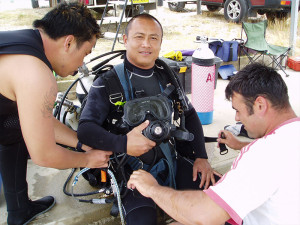
It is the candidate’s responsibility to gather sufficient evidence to support their application for recognition. This evidence may include:
- Obtaining a copy of the relevant units of competency from ADAS
- Aligning the competencies for the qualification with the competencies associated with previous education, training or workplace experience
- Collecting any documentation, references and relevant examples to support the application
- Providing proof of ownership of any examples of work
- Submitting certified copies of qualifications.
More details relating to RPL/RFT can be found on the Recognition of Prior Learning page of this website.
Mutual Recognition/Credit Transfer
As per its mutual recognition obligations as a Registered Training Organisation (RTO), ADAS recognises the Australian Qualifications Framework (AQF) qualifications and Statements of Attainment issued by other RTOs for all non-diving activities.
Applicants who have gained nationally recognised units of competency through previous formal training may be eligible to gain credit of those same units if they are contained within an ADAS training and assessment course. Credit transfer is potentially available for any unit of competency gained within the previous five (5) years of the ADAS training.
Credit transfer is only provided for qualifications or Statement of Attainments where there is clearly a direct correlation to ADAS training. RPL will need to occur in instances where there is no direct correlation.
Previous training which was completed with an international organisation may be acceptable for mutual recognition and Recognition of Prior Learning. In these cases, applicants are to submit a portfolio of evidence to the ATE to support their application for recognition of previous training.
Fees, Charges and Refunds
The fees for each ADAS accredited course are shown in the relevant information package provided by ADAS ATEs. Unless otherwise specified, all training and assessment materials are included in the cost.
In general, fees are to be paid before the completion of the course. If for any reason any payments are owed or outstanding at the end of the course, certification will not be issued until accounts are settled.
Refund Policy
ADAS realises that cancellation or deferment of a course registration is sometimes unavoidable. Refunds are potentially available for training undertaken at both government and non-government training organisations. Each ATE is required to have a Fees Refund policy in place and to clearly articulate that policy to candidates.
In relation to government funded courses, refunds will be made in accordance with the requirements and conditions imposed by the government body funding the course. Any administration fee paid is generally not refundable if a participant withdraws from the course or training program.

Behaviour and Disclipline
All hyperbaric teams, such as dive teams, need to be close-knit as every member knows that he or she is relying on others as well as being relied upon in return. Assessment of competence as an occupational diver/hyperbaric worker includes consideration of a trainee’s ability to function effectively as part of the team. This includes the trainee’s ability to interact positively with the other members of the team and to behave responsibly, appropriately, and considerately during all facets of training.
Trainees will be counselled whenever their performance is unsatisfactory or when their behaviour is considered inappropriate. This includes behaviour which impacts adversely on the safety, performance, or functioning of the team. Counselling may be informal or formal, with all formal counselling being recorded. The outcome of initial counselling may include a caution.
Continued behavioural problems after formal counselling may lead to more severe forms of disciplinary action such as:
- Probation: Indicates a previous caution has been given and if the trainee’s performance or behaviour continues to be unsatisfactory would normally lead to suspension from the course.
- Prohibition: Is appropriate is the event of alcohol or substance abuse, or a health problem, and may be used with probation. The trainee will not be permitted to enter the water during this prohibition period.
- Suspension: Is appropriate for a serious offence such as ignoring a safety directive, aggressive or abusive behaviour, continued alcohol or substance abuse, or wilfully damaging equipment. The trainee will be suspended from all course activities at the discretion of the ATAM, but will be given the opportunity to complete the course at a later date at the student’s own expense.
- Dismissal: Is appropriate in the event of theft, violent behaviours, cheating, plagiarism, collusion or interference with other participant’s work, and when all other disciplinary action has failed. The trainee may be dismissed from the course and will not be given a refund or an opportunity to attend further training without a demonstration of a substantial change in behaviour.
Access & Equity
ADAS will ensure that all participants have equitable access to the training and assessment programs, irrespective of their gender, age, race, religion, culture, linguistic background, marital status, location, socio-economic background, disability, sexual preference, family responsibility or political conviction.
ADAS and its staff are committed to ensuring that all training and assessment policies and procedures, including nominations and enrolments into training courses, incorporate access and equity principles. ADAS ensures that all people involved act in an ethical and responsible manner, ensuring fairness and compliance with equal opportunity and anti-discrimination legislation.
Complaints / Grievances and Appeals
The purpose of the ADAS Complaints and Appeals policy is to provide existing and prospective students who have a grievance in relation to academic and non-academic matters with a clear process for making their grievance and receiving fair treatment. The procedures related to this policy may be used by all students regardless of which ATE they trained with; the mode of study; or the student’s place of residence.
Non-academic matters may include (but are not limited to) operational, administrative, discrimination and harassment issues. Examples of these include sexual harassment; racial or sexual discrimination; physical or verbal abuse.
Academic grievances relate to training or assessment issues, for example, disagreements over assessment outcomes.
This policy does not replace or modify policies, or any other responsibilities, which may arise under other vocational education provider policies or under statute or any other law. The dispute resolution procedures outlined below do not reduce, replace or limit an individual’s right to pursue other legal remedies.
A student who has ceased their enrolment in their studies at ADAS or at an ADAS ATE will be considered under this policy for a period of up to twelve (12) months after their enrolment has finished.
Procedures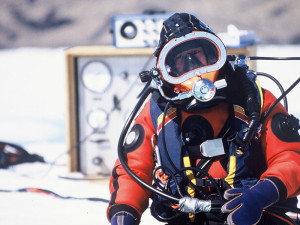
During all stages of the grievance procedure, ADAS will take all steps to ensure that the complainant and respondent will not be victimised or discriminated against.
An explanation in writing for decisions and actions taken at any stage of the process will be provided.
Feedback from students about ADAS courses, trainers, staff and services is encouraged and will not be viewed as a grievance unless specific action is requested.
Informal Grievance
Students are encouraged to initially resolve the grievance informally by communicating directly with the person concerned to resolve the problem; by discussing the issue with the ATE training manager; or seeking the assistance of the Executive Director ADAS.
Formal Grievance
If the grievance is not resolved through informal procedures, students may utilise the ADAS grievance procedure. There is no cost for undertaking this grievance process.
The formal grievance procedure begins when a past, current, or prospective student submits to the Executive Director ADAS a Formal Non-academic Grievance form or a Formal Academic Grievance form.
A written confirmation from the Executive Director ADAS will be sent to the complainant within five (5) working days informing them of receipt of their grievance. The confirmation will:
- Advise the complainant of the process that will be followed, the timeframes that will be required and the steps the complainant should take for this stage of the particular grievance.
- Advise the complainant of their rights to appeal.
The grievance resolution process will commence within ten (10) working days and all reasonable measures will be taken to finalise the process as soon as practicable. The Executive Director ADAS (or delegated nominee) will investigate the grievance and interview anyone associated with the grievance to gain a full understanding of the issues to make a considered decision. Both the complainant and/or respondent(s) may be accompanied by a third a party, if desired, during these interviews.
The Executive Director ADAS (or delegated nominee) will provide a written decision to the complainant within fifteen (15) working days, outlining the reasons for the decision; the complainant’s right to appeal the decision; and the name and contact details of the person they can appeal to if they are not satisfied with the decision.
Appeals
If the complainant wishes to appeal the original decision, they must do so in writing within twenty (20) working days of being informed of the decision. The appeal is to be addressed to the Appeals Committee of the ADAS Board and must detail the reasons for the appeal.
If the student is currently enrolled with an ATE and chooses to appeal the original decision, the ATE involved will maintain the student’s enrolment while the appeal process is ongoing.
The Appeals Committee of the ADAS Board, which is senior to and independent from, the original decision maker, will acknowledge receipt of the request in writing within five (5) days of receiving the complaint. The complainant will be advised of any likely delays.
The Appeals Committee will convene as soon as possible to review the original decision and interview anyone related to the grievance. Both the complainant and/or respondent(s) may be accompanied and assisted by a third party, if desired, during these interviews.
The decision of the Appeals Committee will be provided to the complainant in writing, outlining the reasons for the decision within 28 days of receipt of the appeal. The appeal decision may uphold or overturn the original decision.
If the original decision is overturned, then the grievance is taken to be proved true and further actions required to address the issues will be identified and implemented.
If the appeal is rejected by the Appeals Committee the complainant will be advised of referral options. These may include external agencies such as the Anti-discrimination Board or The Office of Fair Trading. Students currently or previously enrolled in an ADAS accredited course may also decide to refer to the matter to the Australian Skills Quality Authority (ASQA).
Forms
Both the Academic and Non-Academic Grievance forms can be found on the Student Support page of the ADAS website or by contacting ADAS directly.
Continuous Improvement
ADAS reviews its procedures for handling complaints and appeals regularly and improvements are made where necessary. All formal complaints are reported to the ADAS Board for review as part of ADAS’ continuous improvement process.
Quality Management & Administration
ADAS has policies and management strategies in place to ensure sound financial and administrative practices. Some of the more pertinent policies and strategies are summarised below.
Student Fees
ADAS guarantees the organisation’s sound financial position and safeguards the fees paid by trainees. Both ADAS and ATEs have refund policies which are fair and equitable, and each ATE has a form of Student Fee Protection in place.
More details can be found in the Fees, Charges and Refunds section of this page.
Insurance
ADAS and individual ATEs have adequate insurance policies in place which include Public Liability, Professional Indemnity, and Workers Compensation.
Continuous Improvement
ADAS has a strong commitment to providing a quality service with a focus on continuous improvement. The organisation values feedback from students, tutors, and industry representatives.
Quality Assurance
Under the provisions of the Australian Quality Training Framework (AQTF), ADAS is required to develop and use quality assurance mechanisms to ensure the assessment of units of competency and qualifications against approved training packages are in line with registration requirements.
ADAS is committed to:
- Providing support to training staff to assist in the delivery of the programs and to ensuring that all necessary materials and equipment are available to the trainers and trainees, and that all administrative matters are handled efficiently;
- Implementing clearly documented procedures for managing, monitoring and evaluating all training and assessment, and for reviewing student/client satisfaction;
- Implementing and refining procedures for selecting and developing trainers and assessors and ensuring that they are kept informed of best practices in Vocational Education and Training;
- Recording, monitoring and reviewing the assessment processes; and
- Developing a comprehensive bank of resources for students and assessors.
ADAS seeks formal and informal feedback for quality assurance, performance, and standard measures from all staff and students.
The Executive Director of ADAS is responsible for the overall implementation of the policies detailed in this document, monitoring compliance with the policies, and addressing any complaints or suggested improvements. The effectiveness of these policies will be monitored through self-assessment and internal audit. Should a breach of any policy be identified, an improvement initiative will be instigated for immediate action.
Marketing
The marketing of ADAS courses is carried out with integrity and professionalism and remains within the guidelines set down by industry and government bodies. In the provision of information, no false or misleading comparisons are drawn with any other training organisation or training product.
Care is taken to ensure that ADAS markets its services consistently with the educational, cultural and regulatory systems of countries in which it seeks to market, and will not detract from the reputation and interests of other Australian institutions.
Written permission is sought from any facilitators, trainees, clients or other organisations referred to in ADAS marketing or advertising material.
VET Certificates and Statements of Attainment
ADAS issues Australian Qualifications Framework (AQF) testamurs to all trainees who satisfactorily complete the requirements of the accredited qualifications on the ADAS scope of registration with ASQA, and who have completed their training with an ATE which is accredited to issue VET qualifications.
Statements of Attainment are issued for the successful completion of individual units of competency, while AQF wall certificates are issued to students who successfully complete all aspects of the qualification.
All Certificates and Statements of Attainment comply with AQF requirements and include the ADAS name and RTO code (88104); the name of the person receiving the certificate; the name and code of the accredited qualification; the date issued; and the signature of the Executive Director of ADAS. Individual competencies completed are identified by an individually numbered code and title.
ADAS aims to issue Certificates and Statements of Attainment to trainees at graduation or within ten (10) working days after receiving evidence of the assessment. This is monitored as part of ADAS’ quality assurance audit process.
Please note that not all ADAS ATEs are accredited to issue VET qualifications and the related documentation. Please contact ADAS if you require further clarification.
Duplicate Certificates
A fee will be charged by ADAS if a candidate requires a duplicate copy of their VET certificate or Statement of Attainment to cover administrative and handling.
To arrange for the replacement of your AQF Certificate click here
ADAS Certification
Once students successfully complete the ADAS training and assessment course, they are issued with an ADAS certification, and a personal records file is created for them on the ADAS database.
Students will also be issued with an ADAS licence which will show their:
- Full name
- Date of birth
- Unique ADAS number
- The certification gained
- Certification details (on the back of the card).
Both the ADAS certification and the licence are valid for a set period. This timeframe is five (5) years for most certifications, except for Diver Medical Technician (DMT) which are valid for two (2) years.
ADAS licences are only valid for diving if divers are certified as “medically fit to dive” in accordance with, as a minimum, the requirements of AS/NZS 2299.1 and they are in possession of an Occupational Diving Medical Certificate issued by an approved medical practitioner. Approved practitioners are those who are:
- Trained and experienced in underwater medicine and accredited by the South Pacific Underwater Medicine Society (SPUMS), the UK HSE; or
- Formally trained at an appropriate course of underwater medicine by the Royal Australian Navy or the Royal Adelaide Hospital; or
- Otherwise trained and experienced in underwater medicine and approved by ADAS.
See the ADAS Certification Conditions page on this website for more details about requirements for maintaining certifications.


